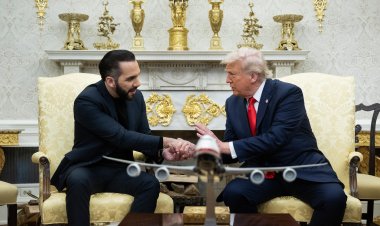A Leading Syria Specialist Discusses Washington's Upcoming Strategy
Syrian President Bashar al-Assad’s potential fall from power may present a significant opportunity for Donald Trump.

Following Assad's departure, the new self-proclaimed Syrian leader, Abu Mohammad al-Jolani, a radical Islamist formerly aligned with al Qaeda in Iraq, has notably softened his stance. As Landis, who has lived in the Middle East for over 14 years and authored the forthcoming book *Syria at Independence: Nationalism, Leadership, and Failure of Republicanism*, notes, President-elect Donald Trump now has an opportunity to engage with Jolani to gain influence over Iran and Russia. “America has wanted a Sunni-led state in Damascus in order to hurt Iran. And Russia. And it’s now got it, right? So you know — why bite the hand that you wanted now?”
This interview has been edited for length and clarity.
**What led to the rapid downfall of Bashar al-Assad's regime?**
After 14 years in power, the Syrian army had lost its will to fight. Soldiers faced poor pay, with officers making just $30 a month and enlisted personnel only $10, forcing many to abandon their posts. The Syrian economy was in shambles and politically bankrupt, leaving citizens without hope for a brighter future.
The United Nations reported that 90 percent of Syrians were living below the poverty line, with food aid dwindling.
Syria’s wealth, primarily sourced from its oil and gas, fell to around 40 percent of government revenue before the uprising. Though Syria does not have significant oil reserves, it produced enough for domestic use—key to sustaining electricity, which now only runs for an hour or two daily. As a result, homes are freezing in winter, and educational facilities are virtually uninhabitable.
These oil wells now predominantly belong to the United States, and they remain in a state of disrepair. Revitalizing the oil industry will be crucial for the Syrian government, leading to potential conflict with the U.S. The rationale for U.S. control—previously linked to denying resources to ISIS, Russia, and Iran—has significantly weakened since the current Syrian government is no longer viewed as a U.S. adversary.
However, the leading rebel group that recently took Damascus, Hayat Tahrir al-Sham, led by Abu Mohammad al-Jolani, previously fought with al Qaeda in Iraq against the U.S. While he has publicly distanced himself from extremist ideologies, questions remain regarding whether he can be trusted as an ally.
**Could the U.S. see them as potential allies?**
That remains to be determined by U.S. officials. Jolani has emphasized a desire for friendship with all and identified Iran, Hezbollah, and Assad as Syria's only enemies. His statements are promising, but skepticism will persist as the U.S. considers sanctions aimed at constraining his government’s rebuilding efforts. However, if Jolani does not openly declare war against the U.S. and instead focuses on governance and bringing back refugees, it would put the U.S. in a compromising position if it fails to engage.
Rumors suggest that Jolani has already reached out to U.S. officials in Washington, which underscores the urgency for the U.S. to assess and react to his new government.
**Is Jolani still on the U.S. terrorist list?**
There is indeed a hefty price on his head, but some Washington figures are advocating for his removal from the terrorist list. The Washington Institute for Near East Policy has been vocal in suggesting a reassessment of him, highlighting his moderation and positive actions.
**How has Jolani and HTS’s ideology evolved?**
He hasn’t established a democratic government, nor has he indicated intentions for democratic reform—something the U.S. has explicitly called for through U.N. Resolution 2254. Despite this, Jolani has exhibited less rigidity than groups like Iran and has opted for a more flexible approach to build alliances with Syrian minorities and the international community.
**Should there be concerns about a resurgence of radicalism in Syria?**
While uncertainty remains about Jolani’s intentions, a shift in legitimacy may occur for groups like ISIS, as their previous justification for opposition to Shiite factions diminishes. As a new Islamist leadership emerges in Damascus, Jolani may need to act decisively against ISIS to soothe Western fears, presenting a significant test of his leadership.
**What is the U.S. position regarding Syria's oil and gas?**
The U.S. acquired control of Syria’s oil and gas resources during its military operations against ISIS, which had taken over the vital oil-bearing areas along the Euphrates River. The U.S. now uses these resources to support Kurdish militias in the region.
The U.S. response to Syria has been sluggish since the Arab Spring erupted in 2011. President Obama faced a dilemma: while he wanted to remove Assad, he was also apprehensive about empowering extremist factions. The disjointed strategy ultimately allowed Russia to intervene in 2015.
The CIA operated under a challenging mandate: to undermine Assad without dismantling the Syrian army, a task unfeasible due to the entrenched Alawite leadership within the military. As al Qaeda and ISIS increased their influence among rebel groups, the U.S. pivoted away from supporting an overthrow of Assad, paving the way for Russia’s involvement.
The Americans might have been secretly relieved with Russia's entry, as it stabilized Assad’s support, resulting in U.S. reluctance to engage aggressively in a Syrian conflict that could escalate with Russia. This led to a tacit division of influence, with the U.S. controlling areas north and east of the Euphrates.
**Did Assad fall due to reliance on Iran and Russia?**
Yes, indeed. Assad’s arrogance blinded him to the fragility of his position. Following Israel's attacks on Hezbollah's leadership, he found himself exposed.
**How critical was Russia's lack of support, particularly given its focus on Ukraine?**
All three factors—Israel’s military actions, the reduced Russian support, and the collapse of Assad’s economic framework—were pivotal in his downfall.
**What does this mean for the Middle East, especially regarding Iran’s diminished influence?**
This situation represents a considerable setback for Iran. With Hezbollah severely weakened and losing its foothold in Syria, Iran's ability to support its regional ambitions has been compromised, eliminating its potential deterrent against Israeli strikes on its nuclear facilities. Israeli Prime Minister Benjamin Netanyahu will likely explore potential cooperation with Trump on this front. Yet, Iran retains substantial capabilities, including advancements in space technology and military development, so dismissing it would be unwise.
**What should President Trump’s policy be toward Syria and the broader Middle East?**
A new chapter appears to have emerged. The U.S. had opposed Assad primarily due to his alliances with Iran and Russia. With the ascendance of a new Syrian government not aligned with these nations, the U.S. should reassess its stance. Although the current regime may lean more Islamist than desirable, it represents a significant shift in the region. The U.S. should deliberate on the opportunity to support a Sunni-led state in Damascus, as it could weaken both Iranian and Russian positions in the Middle East.
Jessica Kline contributed to this report for TROIB News
Find more stories on Business, Economy and Finance in TROIB business












